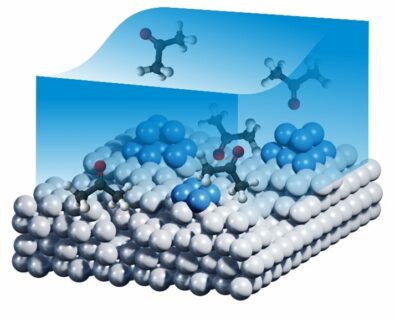New catalysts electrify hydrogen storage technology
A team of scientists from the Department of Chemistry and Pharmacy, in collaboration with colleagues from Charles University in Prague, Czech Republic, have made a significant advance in understanding future hydrogen storage technology. Their latest research, published in the ACS Energy Letters, reveal the active configuration of catalysts to generate electricity from hydrogen storage systems.
The work focuses on electrochemically active liquid organic hydrogen carriers (EC-LOHCs), a promising technology for safe and sustainable hydrogen storage and energy conversion. The researchers explored various platinum-ruthenium surface alloys to identify the most effective catalyst for converting isopropanol to acetone – a key reaction in the EC-LOHC system. They show that tiny clusters of platinum are formed by an electrochemical activation, which demonstrate the highest known activity for this type of chemical reaction. The findings were made possible using a combination of electrochemical and surface science techniques, providing a comprehensive understanding of the catalyst’s properties. This achievement not only advances fundamental science but also contributes to the development of new technologies for a sustainable energy future.
Further information:
Alexander Simanenko, Pankaj Kumar Samal, Robert Hübsch, Jan Skvara, Juntao Yang, Maximilian Kastenmeier, Florian Winkler, Tomas Skala, Nataliya Tsud, Sascha Mehl, Josef Myslivecek, Olaf Brummel, Yaroslava Lykhach, Jörg Libuda, Origin of the Low Overpotential for Isopropanol Oxidation on PtRu Electrocatalysts, ACS Energy Letters (2024)
https://pubs.acs.org/doi/10.1021/acsenergylett.4c01987
Contact:
Dr. Yaroslava Lykhach, Dr. Olaf Brummel, Prof. Dr. Jörg Libuda
Interface Research and Catalysis
ECRC
Friedrich-Alexander-Universität Erlangen-Nürnberg
